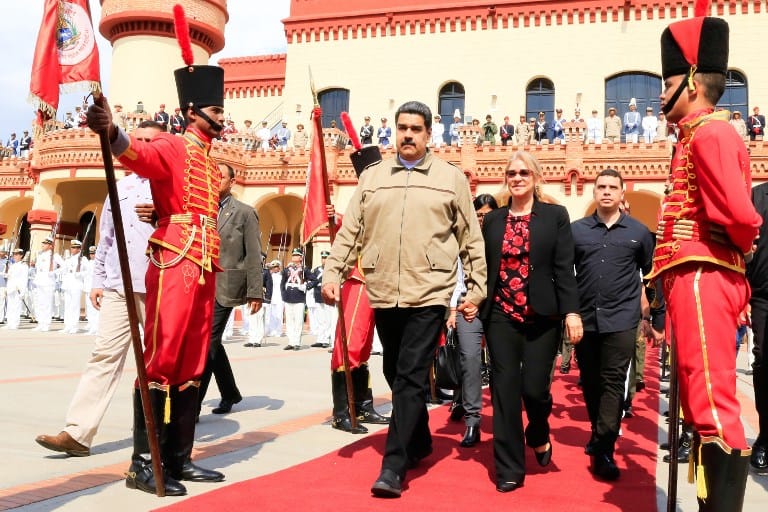The countries that make up the TIAR inter-American defense pact decided Monday to activate the treaty and act collectively in order to sanction senior government officials of the president of Venezuela, Nicolás Maduro.
This initiative, promoted by the United States, was approved by 16 votes in favor, out of a total of 19 countries that make up the Inter-American Treaty of Reciprocal Assistance (TIAR), also known as the Rio Treaty. Uruguay voted against the decision, Trinidad and Tobago abstained, and Cuba was absent.
“The Rio Treaty provides the region with an opportunity to finally take corrective action,” said John J. Sullivan, deputy secretary of state, who represented the United States during the meeting.
Colombian Foreign Minister Carlos Holmes said that voting in the TIAR Consultation Body allows countries “to use all available measures to investigate, prosecute, capture, extradite and punish” designated officials.
It also enables the assets of designated persons to be frozen in any of the signatory countries.
Holmes explained that this instrument will allow them “to identify and designate persons and entities of the Nicolás Maduro regime involved in crime networks.”
The meeting was held in New York amid the struggle between the government of Nicolás Maduro and the leader of the Parliament, Juan Guaidó, who is recognized by more than 50 countries — including Costa Rica — as interim president of Venezuela and considered as such by the Organization of American States (OAS).
– Trump meeting on Venezuela –
The defense treaty is made up of Argentina, Bahamas, Brazil, Chile, Colombia, Costa Rica, Dominican Republic, El Salvador, Guatemala, Haiti, Honduras, Panama, Paraguay, Peru, Trinidad and Tobago, United States, Uruguay and Venezuela, as well as Cuba.
Cuba does not participate in the mechanism but never withdrew from the pact. In this meeting, Venezuela was represented by delegates from Guaidó, since the meeting had been convened within the OAS.
Venezuela had abandoned the treaty six years ago, but in July, the country’s National Assembly — led by Guaidó — approved its return.
Guaidó welcomed the decision by stating that they have “the support and recognition of the world.”
According to a senior State Department official, TIAR is a useful mechanism of economic and diplomatic pressure and to impose sanctions against Venezuela that the United States wants more countries to apply.
“There are a large number of countries in the hemisphere that do not have much legal basis in their internal laws for the imposition of such sanctions,” the diplomat said before the announcement.
For the United States, the transition in Venezuela remains at the top of its international political agenda, the official said.
Wednesday, the president of the United States, Donald Trump, will meet with leaders of the countries of the region to address the crisis in Venezuela within the framework of the UN General Assembly.
– ‘Binding for the entire region’ –
Julio Borges, the head of Foreign Affairs of Guaidó, said the resolution is “a binding decision for the entire region.”
“This also has the effect of frightening those who are still in Venezuela exercising public functions and stealing money or those who run repressive bodies,” Gustavo Tarre, delegate of Guaidó to the OAS, said.
The countries of the Lima Group, meanwhile, once again described Maduro’s government as “illegitimate and dictatorial,” and accused it of preventing the advance of a dialogue to reach a solution to the crisis through free elections.
In mid-September, Guaido declared “exhausted” the instance of the dialogues that the government and the opposition had held in Barbados since May with the mediation of Norway.
A day later, Maduro announced that he had reached an agreement with a minority sector of the opposition to form a dialogue table.
The Lima Group, which includes Argentina, Brazil, Canada, Chile, Colombia, Costa Rica, Guatemala, Guyana, Honduras, Panama, Paraguay, Peru and Saint Lucia, was created two years ago to adopt a common position in the face of the Venezuelan crisis.
According to the UN, the situation in Venezuela has unleashed the exodus of some four million people, mainly to countries in the region.
The Contact Group that includes the European Union, Costa Rica, Ecuador, Panama, Bolivia and Uruguay also met this week.
During the meeting, the head of European diplomacy, Federica Mogherini, said the situation in Venezuela is still tenuous and insisted on the search for a “negotiated and peaceful” solution that leads to credible and transparent presidential elections.








